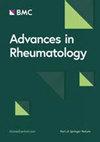Hyperuricemia and intravenous fat emulsion are risk factors for gout flares during active gastrointestinal bleeding: a case control study
IF 2
4区 医学
Q3 RHEUMATOLOGY
引用次数: 0
Abstract
It is well-established that patients with a history of gout are more susceptible to experiencing gastrointestinal bleeding. Gout flare during active gastrointestinal bleeding poses a significant challenge due to the gastrointestinal side effects of anti-inflammatory therapy. This study sought to investigate the risk factors associated with gout flares during episodes of gastrointestinal bleeding. We conducted a retrospective observational study involving 94 patients who experienced active gastrointestinal bleeding and had a history of gout. This study was conducted at Jinhua Municipal Central Hospital from January 2019 to October 2022. We collected and recorded demographic information and clinical characteristics. Among the gout flare patients, hyperuricemia and intravenous fat emulsion therapy were more prevalent compared to those who remained stable (81.6% vs. 57.8% and 46.9% vs. 24.4%, p < 0.05). Multivariate logistic regression analysis revealed that both hyperuricemia (odds ratio 2.741, 95% CI 1.014–7.413, p = 0.047) and intravenous fat emulsion therapy (odds ratio 2.645, 95% CI 1.046–6.686, p = 0.040) were independent predictors of gout flares. Furthermore, gout attacks occurred sooner in patients receiving intravenous fat emulsion therapy compared to those not receiving it (median: 4 days (interquartile range: 2) vs. median: 5 days (interquartile range: 2.25), p = 0.049). Our study revealed a high incidence of gout flares during episodes of active gastrointestinal bleeding, with patients undergoing intravenous fat emulsion therapy and those with hyperuricemia being at increased risk.高尿酸血症和静脉注射脂肪乳剂是活动性消化道出血期间痛风复发的风险因素:一项病例对照研究
众所周知,有痛风病史的患者更容易出现消化道出血。由于抗炎治疗的胃肠道副作用,在活动性胃肠道出血期间痛风复发是一项重大挑战。本研究旨在调查胃肠道出血发作期间痛风复发的相关风险因素。我们进行了一项回顾性观察研究,涉及 94 名活动性消化道出血且有痛风病史的患者。这项研究于2019年1月至2022年10月在金华市中心医院进行。我们收集并记录了人口统计学信息和临床特征。在痛风发作患者中,高尿酸血症和静脉注射脂肪乳剂治疗的发病率高于病情稳定者(81.6% vs. 57.8%,46.9% vs. 24.4%,P < 0.05)。多变量逻辑回归分析显示,高尿酸血症(几率比2.741,95% CI 1.014-7.413,p = 0.047)和静脉注射脂肪乳剂治疗(几率比2.645,95% CI 1.046-6.686,p = 0.040)是痛风发作的独立预测因素。此外,与未接受静脉注射脂肪乳剂治疗的患者相比,接受静脉注射脂肪乳剂治疗的患者痛风发作的时间更早(中位数为 4 天(四分位间范围为 1.5 天)):4天(四分位数间距:2)对中位数:5天(四分位数间距:2.25),P = 0.049)。我们的研究显示,在活动性消化道出血期间痛风复发的发生率很高,接受静脉注射脂肪乳剂治疗的患者和高尿酸血症患者的风险更高。
本文章由计算机程序翻译,如有差异,请以英文原文为准。
求助全文
约1分钟内获得全文
求助全文
来源期刊

Advances in Rheumatology
Medicine-Rheumatology
CiteScore
4.00
自引率
4.30%
发文量
41
审稿时长
53 weeks
期刊介绍:
Formerly named Revista Brasileira de Reumatologia, the journal is celebrating its 60th year of publication.
Advances in Rheumatology is an international, open access journal publishing pre-clinical, translational and clinical studies on all aspects of paediatric and adult rheumatic diseases, including degenerative, inflammatory and autoimmune conditions. The journal is the official publication of the Brazilian Society of Rheumatology and welcomes original research (including systematic reviews and meta-analyses), literature reviews, guidelines and letters arising from published material.
 求助内容:
求助内容: 应助结果提醒方式:
应助结果提醒方式:


